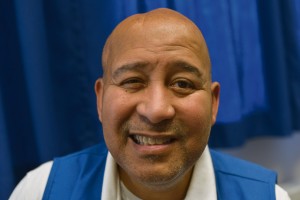
For many, it starts with a headache. But millions of people get headaches every year, so it’s nothing out of the ordinary, right?
Soon however, the headache carries over for days, weeks and sometimes months. Suddenly, it becomes apparent to these individuals that something is wrong, but they don’t report it and continue to live with a constant throbbing in their head.
These can be cases of traumatic brain injuries, according to Lorrie Cappellino, Landstuhl Regional Medical Center Traumatic Brain Injury and Rehabilitation Clinic nurse educator, and reporting these possible concussions or worse is an issue with service members.
“Service members are occupationally at risk,” Cappellino said. “They can often be reluctant to admit they need treatment (for a possible TBI) because they don’t want to appear weak or just don’t understand the severity of these concussions or a mild TBI.”
The TBI clinic offers evaluation, assessment, treatment and follow-up services for service members, beneficiaries and retirees who have sustained a TBI and have ongoing symptoms.
According to a statistic published by the Defense and Veterans Brain Injury Center in 2015, over 25,000 service members were reportedly affected by a TBI in 2014.
This number has rapidly increased over the years, but this isn’t due to more incidents occurring, rather the increase in reports, according to Cappellino.
One of Cappellino’s patients, Wilbur Boulware, was affected by TBI from a stroke in 2012. Since then, he has undergone many surgeries and is still being treated at the clinic.
“My treatment’s been excellent,” Boulware said. “I (am thankful) that we all have a TBI clinic because you’d be surprised about how many people suffer from a TBI.”
His time at the clinic has allowed him to see the progress of people that are treated early for TBI.
“I’ve seen so many people come through this clinic,” Boulware said. “By the time I see them leave, they look whole again.”
Boulware was treated four years ago and is now volunteering at the clinic with the American Red Cross. His recovery has allowed him to become one of the faces that greets people when they walk into the clinic’s front doors.
However, those who waited to report or failed to identify concussions aren’t so lucky, according to Cappellino.
“There are people who, after waiting so long to report a concussion, never return to their highest performance levels,” Cappellino said. “It takes the brain a lot longer to heal after waiting so long and can permanently affect vision and cognitive abilities. Those lower performance levels start to cause issues with work or home life and build.”
Since March is TBI awareness month, the TBI clinic has events going on all month to engage with people and educate them on what it is, why they should report it, and how they can.
Even if it only results in a slight headache, all head collisions should be reported immediately. If you think you’ve suffered a concussion in the past or have questions for the TBI clinic in regards to events, contact them at 590-5601 or 06371-9464-5601.


